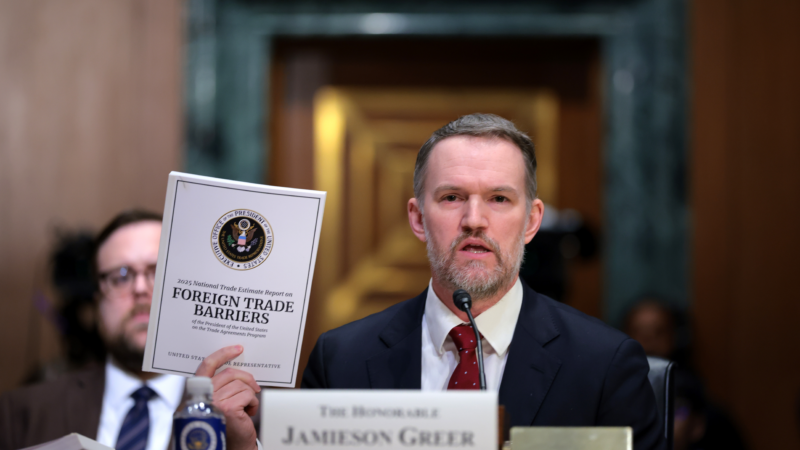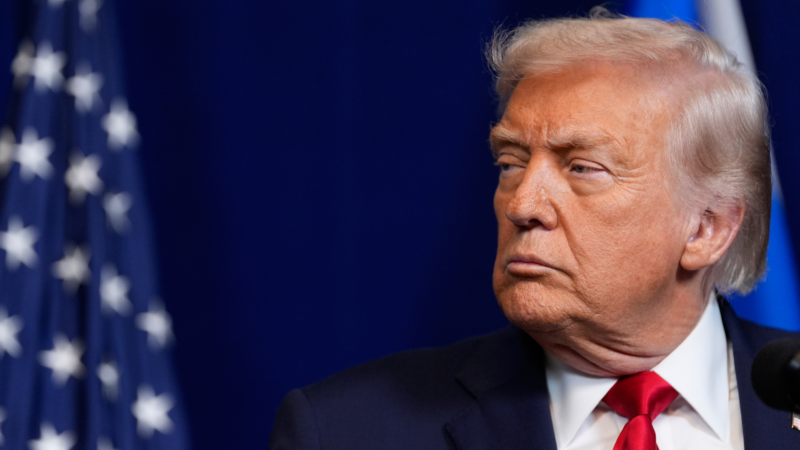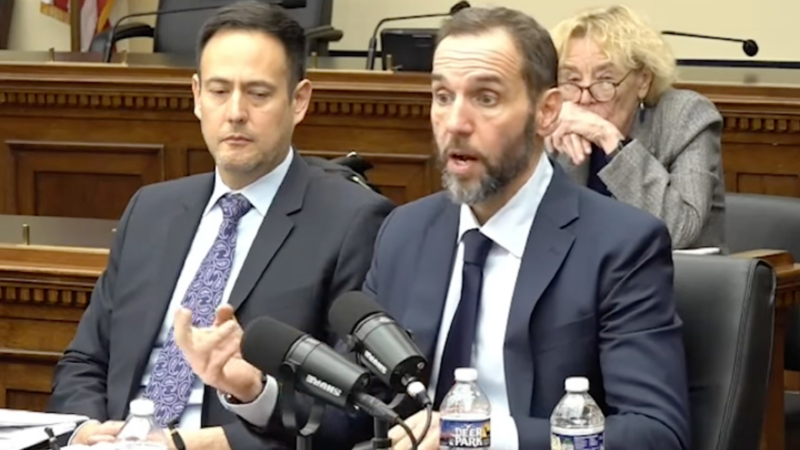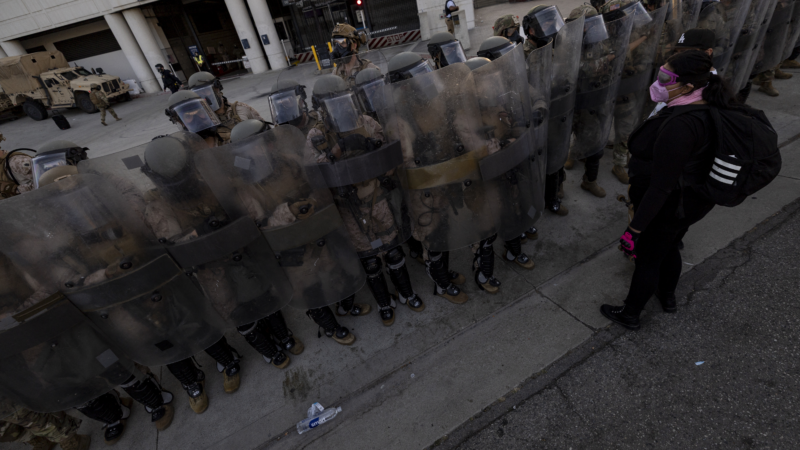Trump trade official signals tariffs are negotiating tool amid GOP skepticism
As market turmoil over President Trump’s sweeping tariffs continued to churn, the nation’s trade representative told a Senate panel the goal of the policy is to negotiate a new series of trade deals.
Jamieson Greer, the United States Trade Representative, said roughly 50 countries reached out to talk with the administration instead of retaliating. That, he suggested, is evidence that Trump’s approach is working. But he faced skepticism and questions from GOP lawmakers on the Senate Finance Committee who wanted answers on the broader strategy.
Even the president’s allies admitted the mixed messaging coming from the White House was confusing — some saying Trump’s tariffs were a tactic to bring countries to the table to adjust trade imbalances with others saying they were a longer term gambit to remake the global trade economy.
Tuesday’s hearing was the first opportunity for a top Trump official to explain the theory of the case before Congress. Greer assured lawmakers that the goal was to incentivize negotiations.
“As these countries approach us, the idea is that we’ve had years and years of nonreciprocal access, and it’s contributed to these trade deficits,” Greer said, and outlined that if they present solutions for shifting the dynamic the message to them was “we want to negotiate with you.”
He repeatedly pointed to examples of countries like Vietnam and India reaching out.
Later, White House press secretary Karoline Leavitt told reporters President Trump directed his trade team to create “tailor-made trade deals” in negotiations with countries seeking tariff cuts.
Leavitt said almost 70 countries have reached out since Trump’s bombshell across-the-board tariff announcement last week.
“The president met with his trade team this morning, and he directed them to have tailor-made trade deals with each and every country that calls up this administration to strike a deal,” she said in a press briefing.
“Each and every one of these trade deals should be tailored and unique based on that country’s markets, based on that country’s exports, the imports here in the United States of America, what makes the most sense for the American worker and for our industry,” Leavitt said.
On Capitol Hill, Greer made clear that China was taking a much harder line, and repeated that Trump’s plans to impose new tariffs would go forward as scheduled for midnight. He said China seems “to be choosing its own path on market access.”
The White House has said tariffs on China are set to rise to at least 104% on Wednesday.
The top Democrat on the committee, Sen. Ron Wyden of Oregon, pointed to retirement funds falling and markets being shut to U.S. goods, saying, “the U.S. economy has gone from the envy of the world to a laughingstock, in less time than it took to finish March Madness.”
Wyden announced he was introducing a bipartisan privileged resolution that would terminate the national emergency Trump invoked to impose his tariffs. Several Democrats co-sponsored the measure and Kentucky Republican Sen. Rand Paul also joined the effort. Last week the Senate approved a similar resolution to undo the tariffs on Canada with four Republicans joining Democrats. But the House of Representatives has no plans to take up the measure.
Republican skepticism and questions
Top Republican leaders continue to say that the president deserves some time to assess the full impact of his policies. Sen. Chuck Grassley, R-Iowa, has introduced legislation to claw back Congressional power over international trade and tariffs that the legislative branch ceded to the executive branch over decades. Grassley repeated his concerns about that dynamic to Greer. But he also said “I support President Trump’s agenda to lower tariffs and non tariff barriers other countries impose on American goods.”
But several Republicans on the Finance Committee made it clear they were hearing from worried constituents, including business owners unable to plan for supply chain issues.
Oklahoma Republican Jim Lankford pressed Greer for a timeline for the tariffs, but the trade representative declined to specify any target date.
Instead Greer cautioned that the trade deficit was “decades in the making but it’s not going to be solved overnight.”
Wisconsin Republican Sen. Ron Johnson, who noted his own experience in the manufacturing sector, told Greer he was disappointed that exclusions for some companies “are being ruled out right now.”
He said “I hope you and the president are very sensitive about companies potentially going bankrupt by these actions.
And Johnson added, “we want fair trade but tariffs are double edge sword and I would argue a somewhat blunt instrument.”
Another Republican, North Carolina Sen. Thom Tillis, admitted he wasn’t an expert but that the Trump administration faced a tight window of roughly 14 months for these policies to demonstrate they were working. Tillis, who is running for reelection in 2026, noted that people who voted for the president and for him, noting he grew up in a trailer park, would face the possible negative impact like job losses.
“I wish you well but I am skeptical.” Tillis concluded.
Sen. Todd Young, R-Ind., asked Greer to factor in that trade retaliation doesn’t fall on everyone evenly noting tech companies in New York feel impacts differently from soybean farmers in his home state. “I hope that’s something that’s s being factored into your analysis.”
Sen. Mark Warner, D-Va., pressed Greer to explain why the administration took the same approach to allies and partners like Canada and Mexico as with adversaries like China.
He reported that he spoke with senior Wall Street executives and one remarked about the market’s gains on Tuesday as “a good day in hospice.”
As the markets brace for fallout on increased tariffs on China on Wednesday Senate Majority Leader John Thune, who has personally cautioned against broad tariffs, noted on Tuesday that Trump ran on the issue in 2024.
“77 million people voted for him and his agenda and I think he serves the opportunity to see what kind of deals he can get from some of our trading partners and I think most of us are giving him space in which to do that and hope he’s successful, because it’s not only good for him and his administration but it’s good for the country.”
Zohran Mamdani sworn in as New York City mayor, capping historic rise
Mayor Zohran Mamdani took the oath of office in New York City after midnight Thursday. The city's first Muslim mayor, a member of the Democratic Socialists of America, has promised to focus on affordability and fairness.
Rising from the ashes, a symbol of hope at the Rose Parade
Survivors of the Eaton and Palisades Fires find healing and community working on a Rose Parade float to honor the lives and communities lost in last year's wildfires.
The history behind the NYC subway station chosen for Mamdani’s swearing-in
The city shut down the station in 1945 on New Year's Eve. Eighty years later, it's a symbolic venue choice for the incoming mayor's private swearing-in ceremony.
U.S. military strikes 5 more alleged drug boats, killing 8
The U.S. military says it struck five alleged drug-smuggling boats over two days. The attacks killed eight people, while others jumped overboard and may have survived. U.S. Southern Command did not reveal where the attacks occurred.
Capitol riot ‘does not happen’ without Trump, Jack Smith told Congress
Former special counsel Jack Smith also described President Trump as the "most culpable and most responsible person" in the criminal conspiracy to overturn the 2020 election results, according to a transcript of Smith's closed-door interview with the House Judiciary Committee.
Trump will drop push for National Guard deployments in Chicago, LA and Portland, Ore.
Courts blocked troops from deploying in Chicago and Portland, Ore., and the Los Angeles deployment effectively ended after a judge blocked it earlier this month.







